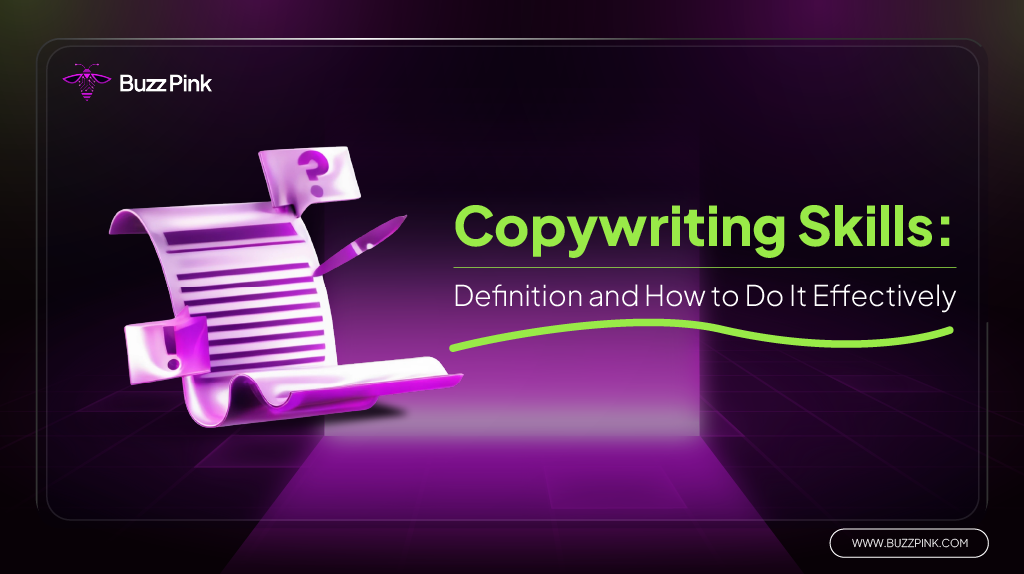Copywriting is the ability to write words that entice people, persuade them, and ultimately motivate them to take action, such as purchasing a product, signing up for a website, or simply reading until the end. A copywriter not only writes simple sentences but also creates messages that “move” readers to take action.
A copywriter’s work is similar to combining the art of writing and psychology. They must be able to write compellingly, understand how their readers feel, and turn curiosity into action. As a result, being a good copywriter necessitates a variety of skills, including writing, research, imagination, and time management.
What Are Copywriting Skills?
 Copywriting skills are the skills required to write effective promotional text. These include the ability to write clearly, understand the target audience, and convey a persuasive message. Copywriters must be able to write in a style that is appropriate for the situation, such as a formal style for a business brochure or a casual style for social media posts.
Copywriting skills are the skills required to write effective promotional text. These include the ability to write clearly, understand the target audience, and convey a persuasive message. Copywriters must be able to write in a style that is appropriate for the situation, such as a formal style for a business brochure or a casual style for social media posts.
Copywriters must possess strong research skills in addition to their writing abilities. They must understand the product or service they are writing about, who will read it, and what is currently trending in the market. The more information they have, the easier it is to write engaging and relevant content.
Copywriting also requires the ability to comprehend human emotions. Great copywriters can construct sentences that make readers feel “called” or understood. They understand when to be funny, when to be serious, and when to make readers think deeper.
In addition, a copywriter must be disciplined and have a strong work ethic. They must be able to complete work on time while maintaining the quality of their writing in order to convey a strong and honest message.
Read More: 5 Tips on How to Avoid AI Detection in Writing
Why Having Copywriting Skills Matters
Copywriting skills are essential because almost every business requires compelling writing. Social media ads, e-commerce product descriptions, and promotional emails all require writing that piques people’s interest and eventually leads to a purchase.
Without good copywriting skills, a company risks losing many potential customers. Boring or difficult-to-understand copy may prompt people to close the page or stop reading. However, engaging writing can help a business appear more professional and trustworthy.
Copywriting skills are beneficial not only for business but also for personal well-being. These skills can be used to write blogs, create social media content, and even more convincingly convey ideas in school. Learning to write persuasively makes it easier to positively influence others.
In short, copywriting is a valuable skill in the digital age. Anyone who wants to succeed in marketing, social media, or even a writing career must understand the fundamentals of copywriting in order to effectively communicate.
Soft Skills Required to Effectively Maximise Copywriting
Copywriters require both technical skills and soft skills, such as attitude and mindset. Soft skills enable writing to come alive and resonate with readers. Here Successful copywriters possess soft skills such as creativity, storytelling, empathy, adaptability, curiosity, and time management.
Creativity
Creativity is the ability to come up with new ideas. Creative copywriters do not simply write as usual, but instead dare to create something unique. To make advertisements more memorable, write them in a humorous style or use wordplay.
However, creativity does not always occur spontaneously. Copywriters may need to seek inspiration from a variety of sources, such as old advertisements, reading the news, or even going for a walk, in order to generate fresh ideas. The more you practice, the easier it will be to come up with new ideas to pique the interest of your readers.
Storytelling
Storytelling is the ability to convey a narrative. Writing with a storyline is more likely to keep readers interested. Instead of directly explaining the benefits of a product, a copywriter may tell a story about how that product helped someone solve a problem.
Stories allow readers to relate to a message on a deeper emotional level. When people are moved by a story, they are more likely to trust and remember the brand or product being discussed.
Empathy
Empathy is the ability to understand other people’s feelings. An empathetic copywriter understands what readers need and how to make them feel heard. For example, if your audience is young, your writing style can be more casual and upbeat.
Empathy makes your writing seem more human and less like a “hard sell.” Readers believe that the writing was written specifically for them, rather than as a form of promotion.
Adaptability
The digital world evolves rapidly. Writing styles that were popular last year may not be relevant today. Thus, copywriters must be adaptable. They must quickly learn new trends and tailor their writing style to the platform they use.
For example, writing for Instagram is not the same as writing for a website or an email. Copywriters who are adaptable can write effectively in a variety of settings and for a wide range of readers.
Read More: Top 10 Principles of Effective Writing for Better Writing Results
Empathy
Empathy is the ability to understand the feelings of others. An empathetic copywriter knows what readers need and how to make them feel understood. For example, if your readers are young, your writing style can be more relaxed and upbeat.
With empathy, your writing feels more human and less like a “hard sell.” Readers feel like the writing was written for them, not just empty promotions.
Adaptability
The digital world is changing at a rapid pace. Writing styles that were popular last year may not be relevant today. Copywriters must therefore be adaptable. They must quickly learn new trends and modify their writing style to fit the platform they are using.
For example, writing for Instagram differs from writing for a website or email. Adaptability enables copywriters to write effectively in a variety of settings and for different types of readers.
Hard Skills Required to Effectively Maximise Copywriting
 In addition to soft skills, copywriters must master technical skills (hard skills) that are directly relevant to writing. Hard skills enable copywriters to produce more effective, professional writing that can compete in the digital marketing world.
In addition to soft skills, copywriters must master technical skills (hard skills) that are directly relevant to writing. Hard skills enable copywriters to produce more effective, professional writing that can compete in the digital marketing world.
Writing Skill
Copywriters rely heavily on their writing skills. Writing must be clear, concise, and easy to comprehend. Copywriters must also know how to structure words so that they are interesting and engaging. Writing does not always imply length, but rather conveying a message succinctly and effectively. Every word serves a purpose, so careful word choice is essential.
Editing Skill
Copywriters must have the ability to edit their work after they have written it. Typos, repetitive sentences, and unclear sections are examples of errors that can be identified through editing. Well-edited writing appears more professional.
The editing process not only corrects errors, but also ensures that the writing style is consistent and on target. A single, small sentence change can sometimes enhance the impact of a message.
Research Skill
Research is a crucial part of copywriting. Without it, writing can feel empty and unconvincing. Copywriters need to consult a variety of sources to ensure accurate and up-to-date information.
Furthermore, research helps understand the target audience—who they are, what they like, and what problems they face. This way, writing can be made more relevant and engaging.
SEO Knowledge
SEO (Search Engine Optimization) is a technique for making your writing easily found on Google. Copywriters need to know how to use keywords, write compelling titles, and structure articles that are search engine-friendly.
With SEO, your writing is not only enjoyable for humans to read but also appears in search results. This is crucial for increasing readership and making your content more discoverable.
Marketing and Sales Skills
Copywriting is always related to marketing. Copywriters need to know how to capture people’s attention and entice them to buy or sign up.
Understanding marketing basics such as promotional strategies, buying psychology, and how to build customer trust makes writing more effective and produces real results.
Technical Skills
In the digital age, copywriters also need to be proficient in using tools like Content Management Systems (CMS), SEO tools, or text editing applications.
Technical skills make work faster and more efficient. For example, using Grammarly to check grammar or Surfer SEO to tailor your writing to keywords.
How to Develop Copywriting Skills
Developing copywriting skills takes time and consistent practice. It’s not enough to just read theory; you also need to write frequently and learn from your mistakes. Here are some ways to effectively practice and improve your copywriting skills.
Through Writing
The best way to learn copywriting is by writing. Every time you write, you’ll discover your own style.
Try writing different types of content, from social media captions to articles to short advertisements. The more you practice, the faster you’ll be able to write fluently and confidently.
Additionally, you can read the work of professional copywriters and try to imitate their style. Over time, you’ll discover your own unique style.
Through Communication
Copywriters must also be good at communicating. This means being able to listen to the client’s needs and explain ideas clearly.
Good communication makes the work process smoother because the copywriter and client understand each other. For example, if a client wants a humorous yet elegant writing style, the copywriter must be able to adapt the desired tone.
Practicing speaking and discussing also helps you write more naturally, as if you were speaking to the reader.
Through Problem-Solving Skills
Writing copy is like solving a puzzle: how do you engage readers quickly? Copywriters must be able to solve problems like “why aren’t readers engaged?” or “how do you create a powerful opening line?”
By thinking like a problem solver, you can find creative solutions to every piece of writing.
The more you face writing challenges, the stronger your critical thinking skills will become.
Through Copywriting Formula (Problem–Agitate–Solution)
One of the most effective ways to learn is to use the classic PAS formula, which stands for Problem, Agitate, Solution.
- Problem: Identify the reader’s problem. For example, “Is it hard to wake up in the morning to exercise?”
- Agitate: Make the reader feel the problem more deeply. “If you keep this up, your body will quickly become tired and it will be difficult to focus.”
- Solution: Offer a solution. “Try the FitWake smart alarm clock, which can help you wake up stress-free.”
This formula makes writing more lively because the reader feels understood and immediately knows the solution.
Through Analyzing Patterns
Copywriters can also learn from other patterns or formulas that have been proven effective, such as:
- AIDA (Attention, Interest, Desire, Action)
First, grab the reader’s attention, then arouse their interest, create desire, and encourage them to take action.
- BAB (Before–After–Bridge)
Show the reader what life is like before and after using the product, then build a bridge by explaining how your product helps them.
- FAB (Features–Advantages–Benefits)
Explain the product’s features, then its advantages, and finally, show the benefits the user experiences.
Learning these patterns helps copywriters write faster and more effectively. Each formula has its own way of capturing attention and convincing readers.
Extra Tips to Enhance Your Copywriting
 Besides technical skills and formulas, there are several psychological tricks often used in copywriting.
Besides technical skills and formulas, there are several psychological tricks often used in copywriting.
- Urgency: Typically used in limited-time promotions, such as “Discount only until tonight!” This encourages readers to act immediately.
- Scarcity: For example, “Only 5 left in stock!” or “For the first 50 buyers only.” People are afraid of missing out, so they make a quicker decision.
- Priming: This is a technique to prepare the reader’s mind before seeing the main offer. For example, showing positive testimonials before showing the product price.
- Decoy Effect: Adding “decoy” options to make one offer seem more attractive. For example, three price packages where the middle package appears to be the most profitable.
- Authority Bias: Using big names or well-known figures to increase trust. For example, “Recommended by the best dentists in Singapore.”
These techniques are often used in advertising and promotional writing because they are effective in subtly influencing readers’ decisions.
Conclusion
Copywriting isn’t just about writing, but about understanding people. A good copywriter knows how to speak through writing, evoking emotions, and leading readers to action.
By combining soft skills like empathy and creativity with hard skills like research and SEO, anyone can become a great copywriter. And most importantly: keep practicing. Because the more you write and learn, the stronger your ability to create inspiring and selling writing will become.
Kamila Putri is a content strategist and digital marketing expert who helps brands craft messages that resonate and drive results. With a strong foundation in SEO, brand voice, and data-driven strategy, she has produced content that performs, whether it's optimized web copy, lead-generating campaigns, or conversion-focused messaging. At Buzz Pink, she applies this expertise to help clients grow through smart, search-focused digital strategies that engage, inform, and convert.


